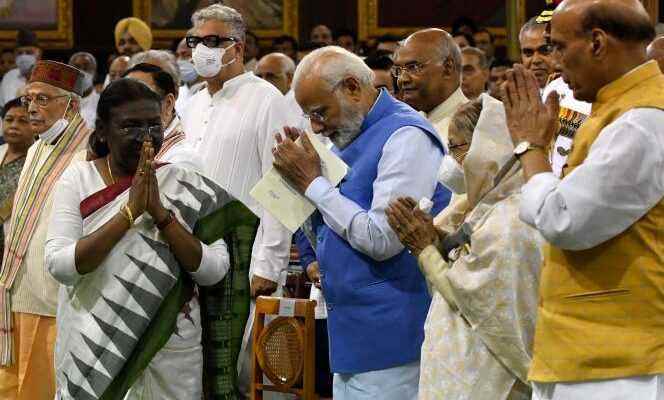The new Indian President, Droupadi Murmu, is not only the second woman to hold this position since independence (1947), but she has just created a historic precedent by becoming the first representative of a community of Adivasis (aborigines) in to be elected at the top of the State. She was sworn in on Monday July 25.
The post of president of India is certainly honorary, and his power comparable to that of the German or Italian presidents. But seeing this woman from the Santal tribe – a poor population of central and eastern India – elected to the presidency is an event in itself. The Adivasis, so-called “indigenous” populations, have long remained marginalized and reclusive, particularly in the center and in the east of the country, in the forests of the states of Jharkhand, Bihar, Assam and Odisha – a state whose Mme Murmu, 64, is from.
All the tribal groups represent 8.6% of the Indian population, or about one hundred million people. The overwhelming majority of them (more than 80%) are listed as still living below the poverty line. In Uparbeda, the native village of Droupadi Murmu, people cook over a wood fire, fetch water from the pump, and electricity has just been installed.
A former teacher, the new president held positions in the administration before becoming a professional politician and occupying several ministerial posts in the regional government of her state of Odisha. In 2015, she became governor of the state of Jharkhand, where nearly 30% of the population is tribal.
Extend the electoral perimeter
A member of the Indian People’s Party (BJP), the ruling nationalist formation, Mme Murmu is also one more piece on the political chessboard of Prime Minister Narendra Modi: it allows this cantor of nationalist Hindu ideology to demonstrate that he is capable of broadening the social base of his training. Drupadi Murmu is the one who “empowers the poor, the oppressed, and especially the marginalized”welcomed the Prime Minister.
“The choice of the Rashtriya Swayamsevak Sangh [Corps national des volontaires, RSS – matrice idéologique du BJP] had previously backed Drupadi Murmu in the previous presidential election five years ago, but at the time Narendra Modi feared losing the vote of the Dalit community [intouchable] : they did not take into account the opinion of the RSS and nominated another candidate, Ram Nath Kovind, a Dalit”, recalls Arati Jerath, an Indian columnist. It was therefore already a question of widening the political-community base, but this time in the direction of voters situated at the bottom of the hierarchy of the caste system.
You have 46.31% of this article left to read. The following is for subscribers only.
